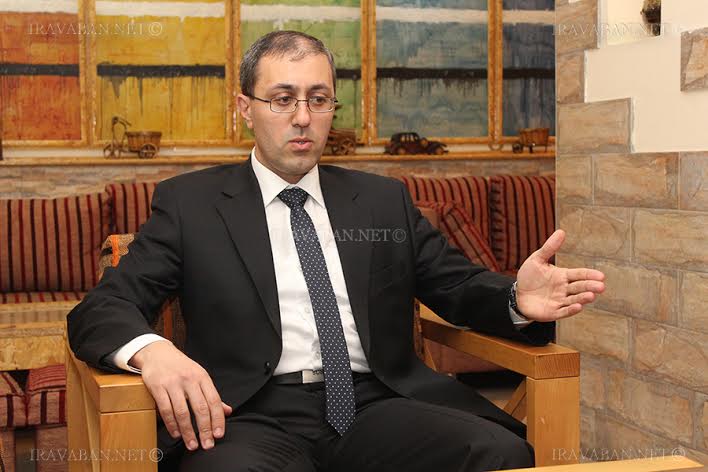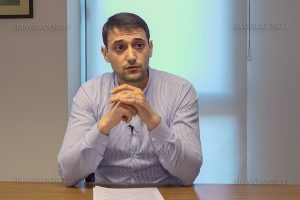Representatives of the executive and legislative bodies have been talking about the need to make constitutional changes for a long time. On 5 November, the Ministry of Justice organized discussions on Constitutional reforms.
Iravaban.net has launched a series of interviews, with the objective to present the observations and opinions of experts in the field on the need for constitutional reform.
We talked on the topic with Mr. Gor Hovhannisyan, Doctor of Law, Associate Professor at the Chair of German and European Constitutional, Administrative and International Law at the University of Hagen; Lawyer, Member of the Saxony Chamber of Lawyers,
– The Ministry of Justice announced the initiation of the constitutional reform. To what extent its need is justified for it now?
– The text of the Constitution has never been a problem in Armenia, the real problem is that the Constitution is not understood correctly. Our courts, and especially the Constitutional Court, understand very little about our Constitution. That is the whole point, and that is the issue that needs to be addressed. Students in our universities do not receive such an education that they understand anything from the Constitution. I say this from my own experience. When I was teaching at the Slavonic University, it was obvious that people understood almost nothing about constitutional law. When we start discussing the real issue, we see that the text of the Constitution is not important at all compared to this issue. If a person’s legal education is not enough to understand the text of the Constitution, it no longer matters what is written there.
During the last 30 years we have lived with 3 different editions of the Constitution. Looking back, life in Armenia has not improved at all during the 30 years, especially the legal life. There have been no positive developments in the operation of the three different constitutions, neither in the protection of human rights nor in the quality of the work of state bodies. Nobody asks what the reason is. It is just this issue that should be discussed, and not the gaps in the Constitution. In the case of Armenia, these gaps do not matter, because those who interpret and apply the Constitution do not understand anything about it. Therefore, it does not matter what is written in it; all the same they will not understand.
There is no need to change the Constitution and there was not in 2015 either.
– What factors should be taken into account before the adoption of the new Constitution and what should be the process of implementation of constitutional reforms?
– There is no need for constitutional reforms. It is the real problem that must be solved, and it is the very bad legal education. When the Constitutional Court of a country, which should be the forge of law and teach everyone what the Constitution is, has no basic idea about it, how can we talk about reforms? We need to talk about training good lawyers. For example, the Constitutional Court has been examining individual applications since 2006. Take and read the decisions on individual applications of the Constitutional Court. You will see that the CC does not know what an individual application is. It has no idea about the preconditions for the admissibility of individual applications, nor is it aware of when the individual application is justified. Let me say more: the court does not even know that it must always check the admissibility and validity of an individual application. Unaware of all this, the court examines individual applications that are inadmissible or upholds individual applications that are not substantiated.
The Constitutional Court does not even know how to check the principle of proportionality. In other words, our legal education is at the level of “minus infinity”. This is a disgrace. How can the issue of constitutional reform be discussed in these conditions? The Constitutional Court must first be educated and taught constitutional law. After all, the Constitution is the responsibility of the Constitutional Court as a final instance.
– RA Prime Minister Nikol Pashinyan once mentioned that during the crisis that arose in 2020, the parliamentary system of government showed its non-viability. Is there a need to change the way the country is governed?
– It’s the same thing. For example, this year the Prime Minister resigned, after being nominated twice, he was not elected so that the parliament could be dissolved by force and new elections could be held. This whole process was unconstitutional. When the Constitution allows for the dissolution of the National Assembly if the Prime Minister is not elected twice, the Constitution does not mean that although the parliament can elect a Prime Minister, it does not elect him deliberately. The Constitution means that the forces represented in the parliament cannot come to an agreement with each other and collect at least as many votes as necessary to elect a prime minister through compromises, and that is why the prime minister is not elected. Only then should the parliament be dissolved, because according to the current Constitution, the parliament has no right to self-dissolve. When we apply the norms of the Constitution as it happened in this case, it means that the parliament has dissolved itself, because it deliberately did not elect a prime minister to be dissolved.
Do you see how the current Constitution is distorted due to lack of understanding? It was unconstitutional not to elect the Prime Minister twice, and the dissolution of the parliament on that basis was unconstitutional. Therefore, the newly formed parliament and all the laws passed by it are unconstitutional, because the parliament was formed in an unconstitutional manner. I already said this in one of my interviews in July, but there was no response. Even lawyers do not discuss this serious problem I have raised. Therefore, there is no reason to say that this Constitution is bad, but the question of why lawyers understand so little about law should be seriously discussed.
– Experts in the field of anti-corruption argue that providing constitutional status and guarantees of independence to anti-corruption bodies, such as the Commission for the Prevention of Corruption and the Anti-Corruption Committee, will increase the independence and efficiency of these institutions. What is your opinion on this issue?
– What difference does it make whether these bodies have constitutional status or not. The point is not that it is impossible to ensure fair and transparent work of these bodies without a constitutional status. In other words, raising the constitutional level is not a prerequisite for independence and efficiency. It is enough that the powers of these bodies are regulated by law, the main directions of activity and laws are clearly applied. In Germany, for example, only the Federal Constitutional Court is considered a constitutional body, but this does not prevent all other courts from acting independently and objectively.
If you do not want to have an independent court, you will not have one, write whatever you want on paper. It makes sense to write something in the Constitution if there is a desire to really do what is written. That desire has never existed in our country.
Mary Mnoyan


















